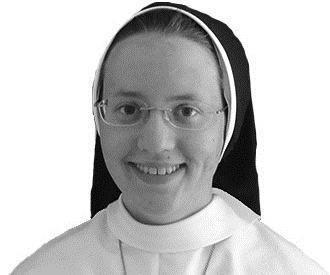In a talk to freshmen at The Catholic University of America this fall, Mrs. Jeanne Garvey, who, along with her husband, university president John Garvey, becomes a beloved support for the students over their four years, began at an unusual starting point.
She quoted Esther Greenwood’s musing in Sylvia Plath’s The Bell Jar about the difficulty of choosing. Esther imagines her life like a fig tree: “from the tip of every branch, like a fat purple fig, a wonderful future beckoned and winked. One fig was a husband and a happy home and children, and another fig was a famous poet and another fig was a brilliant professor.” Esther goes on: “I wanted each and every one of them, but choosing one meant losing all the rest, and, as I sat there, unable to decide, the figs began to wrinkle and go black, and, one by one, they plopped to the ground at my feet.”
Many young people relate deeply to this feeling of paralysis in the face of choice; Mrs. Garvey provided a refreshing commentary: you do not need to know right now what to choose, because God knows. Shifting the perspective from our own narrow vision to the eternal, loving vision of God reminds us that His choice of us is the stable ground on which we stand and from which we make any choice.
God does not struggle with commitment, as many of us do. Pete Davis writes in Dedicated that we fear choice because we fear regret, or missing out on other things, or association with something that turns out badly. God’s commitment to us is free of any of this. He knows us fully and loves us unconditionally.
We can hear Him saying to each one of us: “Before I formed you in the womb I knew you, before you were born I dedicated you” (Jer 1:5). “It was not you who chose me, but I who chose you, and appointed you to go bear and fruit, fruit that will last” (Jn 15:16). As St. John Henry Newman wrote,
God has created me to do Him some definite service. He has committed some work to me which He has not committed to another. … He has not created me for naught. … I shall be an angel of peace, a preacher of truth in my own place, while not intending it if I do but keep His commandments. Therefore, I will trust Him: whatever I am, I can never be thrown away. If I am in sickness, my sickness may serve Him, in perplexity, my perplexity may serve Him. If I am in sorrow, my sorrow may serve Him. He does nothing in vain. He knows what He is about.
The key here is, “if I do but keep His commandments.” And the greatest of these is love of Him. He is the “one thing necessary.” If I simply choose Him each day, the vision of my future as an impossibly branching fig tree yields to the reality that I myself am called, here and now, to be a tree nourishing others with the fruits of His peace and truth.
Sr. Maria Veritas Marks, OP, is a member of the Ann Arbor-based Dominican Sisters of Mary, Mother of the Eucharist.










